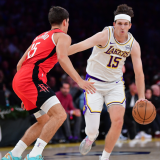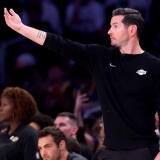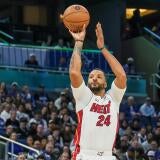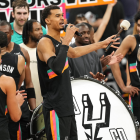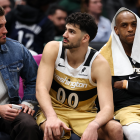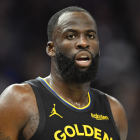As Green and Westbrook exchange shots, low blows highlight broader issues
Game 3's below-the-belt incident raises several ongoing concerns in the NBA

OKLAHOMA CITY -- In the aftermath of Draymond Green's kick to Steven Adams' groin in Game 3 of the Western Conference finals, the issue of intent became paramount.
Green himself invoked it as a defense.
"I don't think I'll get suspended since I don't know how anyone could possibly say I did that on purpose, regardless of the way it may look," Green said.
Ultimately, with no way to prove Green's intent, he was right; Green didn't get suspended for Game 4. But the NBA upgraded the infraction from a flagrant-1 to a flagrant-2 and fined Green $25,000. The upgrade keeps Green in the lineup for the Warriors, who trail the Thunder 2-1 after a 133-105 beatdown Sunday night. But it puts him one flagrant away from automatic suspension under league rules for the playoffs.
"After a thorough investigation that included review of all available video angles and interviews with the players involved and the officials working the game, we have determined that Green's foul was unnecessary and excessive and warranted the upgrade and fine," said Kiki VanDeWeghe, the league's executive vice president of basketball operations.
"During a game, players -- at times -- flail their legs in an attempt to draw a foul," VanDeWeghe said, "but Green's actions in this case warranted an additional penalty."
Not the ultimate penalty. Which was probably the most sensible compromise, given the facts and the key piece of information that was missing.
Did Green do it on purpose?
We'll never know. We do know that intent didn't matter for the Cavaliers' Dahntay Jones, who just a day earlier had been suspended for striking the Raptors' Bismack Biyombo in the groin. Previously, Marcus Smart was suspended one game for a blow to the groin in 2015. Ditto for Dennis Schroder in 2013 and Dwyane Wade in 2012.
The fact that Green's incident came as part of a shooting motion -- or a flopping and flailing motion, depending on your perspective -- probably saved him. And whether you believe Green's rambling explanations or not -- I am dubious -- I never believed the league would suspend him without unequivocal proof of intent.
On a broader scope, why the preponderance of below-the-belt contact in NBA games? Steve Kerr, who coaches in this era and played in a different one, has some theories.
"It's a competitive game," Kerr said on Monday. "Guys are talking trash out there. It's high-level intensity, and there's frustration. As I said, there's also a lot of flailing, a lot of flopping. This league is rampant with guys flailing arms and legs trying to get fouls. Every game you watch people are doing that and sometimes that can lead to contact."
The leg-kick -- when a shooter kicks his leg forward on his release in an attempt to draw a foul -- has become commonplace. At its worst, it's a form of flopping. But it can also be construed as a tactic to prevent a defender from occupying the shooter's landing space.
Whether you view these tactics as flopping or gamesmanship, Green followed his coach's lead on Monday in pointing the finger of blame squarely at Russell Westbrook -- who said Monday night he believed that Green kicked Adams in the groin in Game 3 on purpose.
"Russell Westbrook kicked me at the end of the half," Green said, referring to his ill-advised foul on Westbrook's 3-point attempt at the end of the second quarter. "He just didn't happen to catch me where I happened to catch Steven Adams at. So, no, I'm not embracing for the worst.
"Russell said I did it on purpose," Green added, "but he's part of the superstar group that started all this acting in the NBA. I didn't."
Russ, your thoughts?
"He fouled me at the end of the quarter," Westbrook said. "That was just a dumb play on his part. That wasn't my fault."
And on the culture of superstar acting that Green alleged Westbrook was part of creating?
"I've never been fined for one flop since I've been playing in the NBA," Westbrook said. "So, I don't know about no flopping or nothing. I don't know how to flop. Seems like he was the one that was failing and kicking his legs yesterday. It wasn't me."
(For the record, Westbrook is correct -- sort of. He's never been fined for flopping, but he received a warning in March 2015.)
Asked if Green was trying to deflect blame, Westbrook said, "That's normal. But hey, gotta bring somebody into it. He wants to take the heat off himself."
Adams, who was hit in the groin by Green's knee in Game 2 as Green drove for a shot -- contact that appeared to be incidental -- said Monday he's contemplating the addition of some protective gear to his ensemble.
"Probably going to consider it, due to the consistency of the hits," Adams said.
Kerr, meanwhile, disputed the notion that Sunday night's incident was Green's second offense.
"He just went up for a shot [in Game 2]," Kerr said. "I don't think you can equate the two. ... Everyone is saying he did this twice. I don't agree with that."
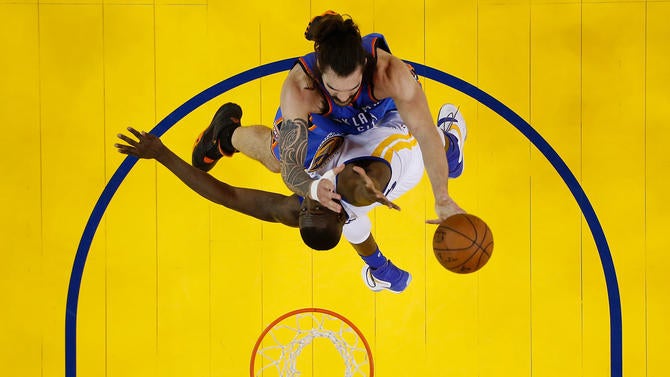
Beyond the obvious on-court impact of the NBA's decision, the incident did raise several issues that the league and its officiating staff are dealing with on a regular basis.
The practice of defenders encroaching on a jump-shooter's landing space is a safety issue as much as it is a competitive one. For their part, offensive players have realized that they can make it appear as though the defender fouled them -- often on a 3-point shot -- by kicking his leg forward and creating contact. The devil's advocate position would be that it's a protective mechanism for the offensive player to protect his landing space. The calls, like most in an NBA game, are increasingly difficult to make.
Green's faux pas has raised questions of evaluating intent and whether or not that should be a factor in the disciplinary process. It's hard enough for the referees to adjudicate a play on its merits; to have to be a mind-reader, too, makes the job all but impossible.
Then, there was the chaos at the scorer's table Sunday night, with crew chief Scott Foster evaluating the replay while on his headset with the NBA replay center. At one point, official Tony Brothers -- who was not at the table -- said something to Kerr that made Kerr lose his mind. A league source told CBS Sports Monday that Brothers informed Kerr that the play was being evaluated to determine whether it was a flagrant-1 or flagrant-2, and that's when Kerr lost it.
Kerr claimed Monday not to remember what Brothers said to him that caused him to lose his mind and start yelling at Foster, who at that point put his headset back on and reviewed the play again with the other member of the crew, Zach Zarba.
"I don't remember, honestly," Kerr said. "I kind of went nuts a few times in the first half."
Why would Kerr lose his mind when informed that the play was being reviewed to determine what variety of foul it was? That's what happens on every flagrant review; the referees review the replay, communicate with league officials in the replay center and determine whether it should be a flagrant-1, flagrant-2 or a common foul.
Which brings us to a larger issue for the league, the teams and the officials who are just trying their best to get all of this right -- or as close to it as humanly possible. Is commissioner Adam Silver's campaign for transparency -- a move perhaps to distance himself from predecessor David Stern and establish his own legacy -- beginning to backfire?
Is it really helpful to the teams, the officials or anyone, frankly, to have the referees' calls and non-calls in the last two minutes of regulation and overtime of every game graded publicly for the world to see? Are the two-minute reports that are released after every night of competition increasing or decreasing confidence in the officials? Or are they making already impossible jobs even harder?
One person involved in the league told CBS Sports Monday that there's a belief among referees that it won't be long before the 2-minute report becomes a 48-minute report -- with every single call and non-call evaluated after the fact. There's also an appreciation among officials, sources say, that correct and incorrect calls are publicized in the 2-minute reports -- as opposed to the former practice of issuing press releases only when key calls were missed.
And in fact, on several occasions in these playoffs, the process of evaluating the officials publicly has been accelerated, with senior vice president of replay and referee operations Joe Borgia taking to NBA TV after games to explain and evaluate calls and non-calls before the official process has even begun -- and without the referees having a forum in which to explain themselves. Borgia did so Sunday night after "the kick." He also did so after the refs missed Westbrook's travel late in the Thunder's Game 1 victory in this series.
By upgrading Green's offense to a flagrant-2 but not suspending him, isn't the league be saying Green should've been ejected, but wasn't?
All questions for another day. In the meantime, the offended party, Adams, is thinking about donning the sort of protective equipment typically reserved for the sport of choice in his native New Zealand: rugby. And from what Adams said Monday, it didn't much matter to him whether Green was suspended or not.
"Regardless, I think we can beat them with or without him," Adams said. "They have plenty of other players that are just as capable."




